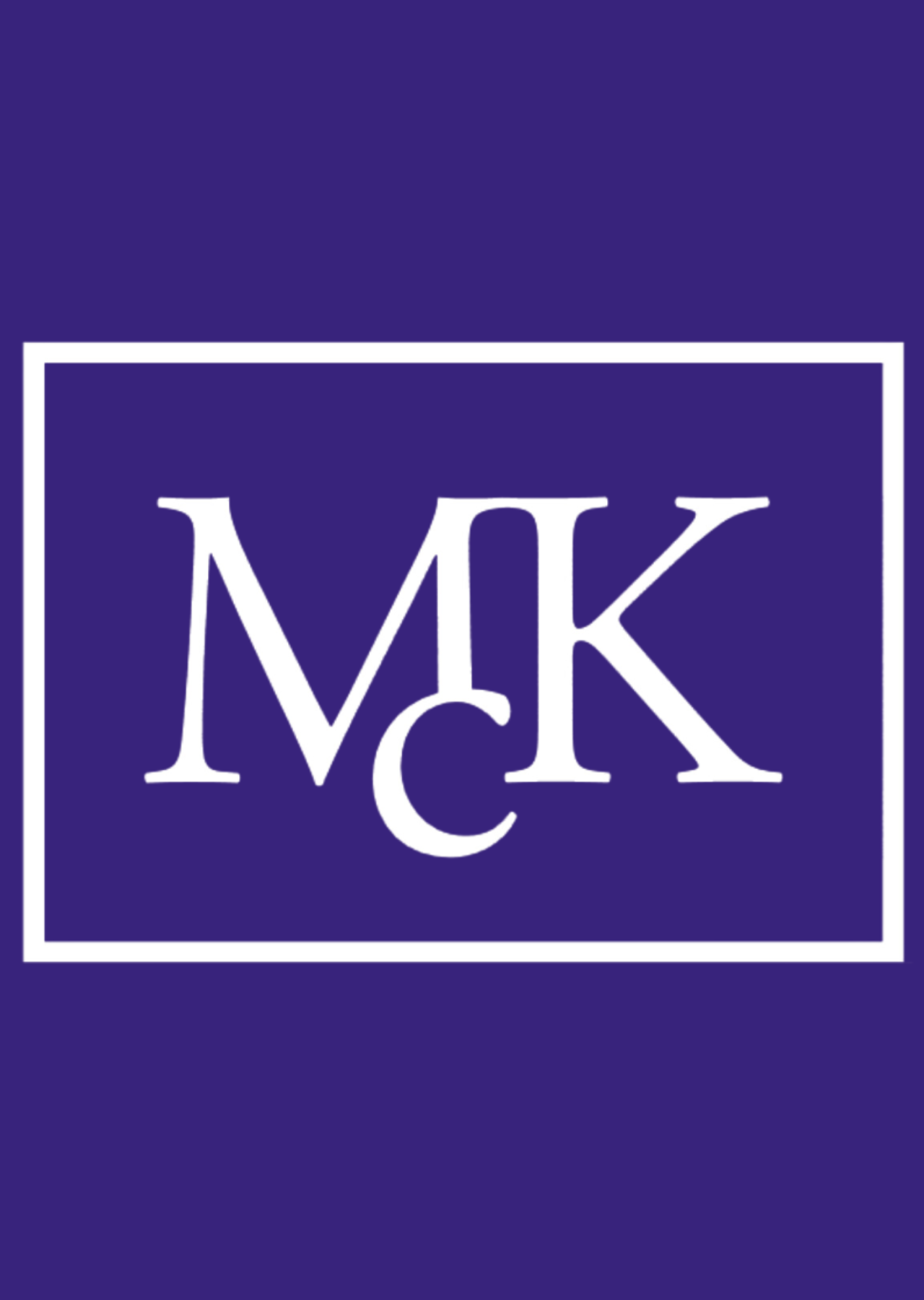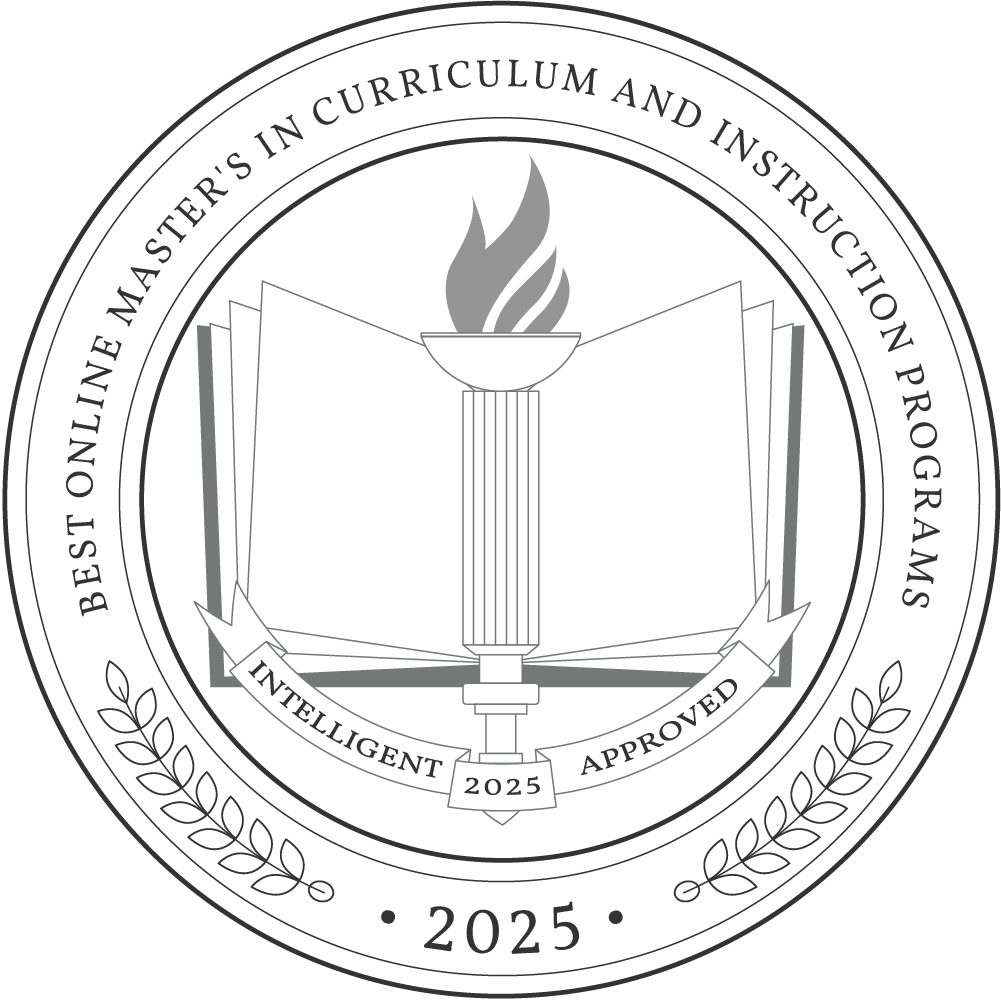If you’re a teacher who wants to shape the bigger picture, analyzing educational theories and trends, an online master’s in curriculum and instruction can further your career plus prepare you to work as an academic administrator or instructional coordinator.
According to the Bureau of Labor Statistics, instructional coordinators earn a median annual salary of $66,490 per year, while K-12 principals make $101,320.
Most schools estimate this degree takes about one to two years to complete, requiring 30 to 45 credits. The average tuition for graduate school is $12,596 at public universities and $28,017 at private institutions.
Why Trust Us
The Intelligent.com Higher Education Team is dedicated to providing students with independent, equitable school and program rankings and well-researched resources. Our expert-driven articles cover topics related to online colleges and programs, paying for school, and career outlooks. We use data from the U.S. Department of Education’s College Scorecard, the National Center for Education Statistics, and other reputable educational and professional organizations. Our academic advisory team reviews content and verifies accuracy throughout the year for the most current information. Partnerships do not influence rankings or editorial decisions.
- Analyzed over 2,000 national, accredited, and nonprofit colleges and universities
- 800+ rankings pages are reviewed and updated yearly
- Content is informed by reputable sources, surveys, and interviews with academic advisors and other experts
- Over 100 data points are reviewed for accuracy and quality throughout the year, including sources
How we rank schools
Our list features the best online Curriculum and Instruction degree programs at top colleges nationwide. Each school featured is a nonprofit, accredited institution — either public or private — with a high standard of academic quality for post-secondary institutions.
We evaluated each school’s program on tuition costs, admission, retention and graduation rates, faculty, reputation, and the student resources provided for online students. We collected data from trusted sources like the National Center for Education Statistics, individual school and program websites, school admissions counselors, and other data sources. Then, we calculated the Intelligent Score on a scale of 0 to 100 based on the following criterion:
Academic Quality:
- Admission rate versus enrollment rate
- Retention rate of students who return after year one
- Accreditation status (regional and programmatic)
- Nonprofit status, both private and public institutions
Graduation Rate
- Overall graduation rate
- Total number of currently enrolled students, including diversity metrics
- Student-to-faculty ratio
Cost and ROI
- In-state and out-of-state per-credit tuition rates and fees
- Required credits to graduate
- Earning potential after graduation
- Availability of federal student loans, scholarships, and other financial aid options
Student Resources
- Available student services for online-only and hybrid programs
- On-campus amenities like tutoring centers and the number of libraries
Read more about our ranking methodology.
Best 41 Accredited Online Master’s in Curriculum and Instruction Programs
FiltersInstitution Type
Status
- Intelligent Score
- Alphabetically By University Name
- Acceptance Rate
- Enrollment
- In-state Graduate Tuition
- Out-of-state Graduate Tuition
- In-state Undergraduate Tuition
- Out-of-state Undergraduate Tuition

Michigan State University
Intelligent Score: 99.97In-state: $15,555
Out-of-state: $40,384
In-state: $18,858
Out-of-state: $18,858
SAT: 1100-1300
ACT: 23-29
$933
Online
Higher Learning Commission
30

University of Florida
Intelligent Score: 99.67In-state: $4,477
Out-of-state: $25,694
In-state: $10,770
Out-of-state: $10,770
SAT: 1290-1460
ACT: 29-33
$448 - $695
Online, On-Campus
Southern Association of Colleges and Schools Commission on Colleges
30

University of Illinois at Urbana - Champaign
Intelligent Score: 98.41In-state: $14,317
Out-of-state: $33,824
In-state: $15,016
Out-of-state: $15,016
SAT: 1200-1460
ACT: 27-33
$520
Online
Higher Learning Commission
32

University of Virginia
Intelligent Score: 97.69In-state: $15,772
Out-of-state: $49,819
In-state: $17,076
Out-of-state: $17,076
SAT: 1320-1510
ACT: 30-34
$622
Online
Southern Association of Colleges and Schools Commission on Colleges
30

Indiana University Bloomington
Intelligent Score: 96.75In-state: $9,815
Out-of-state: $36,194
In-state: $9,786
Out-of-state: $9,786
SAT: 1120-1350
ACT: 24-31
In-State: $320
Out-of-State: $450
Online
Higher Learning Commission
30

Texas A&M University TLAC
Intelligent Score: 96.62In-state: $8,395
Out-of-state: $36,849
In-state: $6,775
Out-of-state: $6,775
SAT: 1160-1380
ACT: 26-32
In-State: $788
Out-of-State: $1,319
Online
Southern Association of Colleges and Schools Commission on Colleges
36

Purdue University
Intelligent Score: 96.18In-state: $9,208
Out-of-state: $28,010
In-state: $9,208
Out-of-state: $9,208
SAT: 1170-1420
ACT: 25-33
In-State: $347
Out-of-State: $600
Online
Higher Learning Commission
30

PennState World Campus
Intelligent Score: 96.13In-state: $15,025
Out-of-state: $24,413
In-state: $22,464
Out-of-state: $22,464
SAT: 1070-1300
ACT: 24-29
$1,027
Online
Middle States Commission on Higher Education
30

Ball State University
Intelligent Score: 95.60In-state: $9,482
Out-of-state: $26,470
In-state: $9,328
Out-of-state: $9,328
SAT: N/A
ACT: N/A
In-State: $464
Out-of-State: $696
Online
Higher Learning Commission
30

Florida State University
Intelligent Score: 93.28In-state: $4,640
Out-of-state: $19,084
In-state: $9,684
Out-of-state: $9,684
SAT: 1220-1350
ACT: 27-31
In-State: $444
Out-of-State: $1,075
Online
Southern Association of Colleges and Schools Commission on Colleges
30

University of Kansas
Intelligent Score: 93.13In-state: $10,092
Out-of-state: $26,960
In-state: $9,989
Out-of-state: $9,989
SAT: 1070-1320
ACT: 22-29
$595
Online
Higher Learning Commission
30

George Mason University
Intelligent Score: 93.06In-state: $9,510
Out-of-state: $32,970
In-state: $12,594
Out-of-state: $12,594
SAT: 1100-1300
ACT: 24-30
$805
Online
Southern Association of Colleges and Schools Commission on Colleges
30

University of Cincinnati
Intelligent Score: 92.85In-state: $9,723
Out-of-state: $25,057
In-state: $13,224
Out-of-state: $13,224
SAT: 1120-1330
ACT: 23-29
In-State: $746
Out-of-State: $761
Online
Higher Learning Commission
30

Texas Tech University
Intelligent Score: 92.13In-state: $8,683
Out-of-state: $20,953
In-state: $6,788
Out-of-state: $6,788
SAT: 1070-1240
ACT: 22-27
In-State: $50
Out-of-State: $470
Online
Southern Association of Colleges and Schools Commission on Colleges
36

University of North Texas
Intelligent Score: 92.11In-state: $8,295
Out-of-state: $18,111
In-state: $6,350
Out-of-state: $6,350
SAT: 1050-1240
ACT: 20-27
$483
Online
Southern Association of Colleges and Schools Commission on Colleges
30

Northwest Missouri State University
Intelligent Score: 92.00In-state: $5,106
Out-of-state: $11,064
In-state: $6,167
Out-of-state: $6,167
SAT: 990-1180
ACT: 19-24
$391
Online
Association for Advancing Quality in Educator Preparation
30

McKendree University
Intelligent Score: 90.65In-state: $31,100
Out-of-state: $31,100
In-state: $9,324
Out-of-state: $9,324
SAT: 871-1277
ACT: 18-28
$455
Online
Higher Learning Commission
31-33

University of West Florida
Intelligent Score: 88.44In-state: $3,735
Out-of-state: $16,004
In-state: $7,088
Out-of-state: $7,088
SAT: 1060-1230
ACT: 21-27
$445
Online
Southern Association of Colleges and Schools Commission on Colleges
33
How to Choose an Online Master’s in Curriculum and Instruction Program
Choose your area of study
This degree is available in several formats, including Master of Education (MEd), Master of Science (MS), and Master of Arts (MA). MEd programs focus on practical applications, while MS and MA options are a good fit for those who plan to continue their education and earn a doctorate.
Some programs allow you to select a concentration and focus your studies on a particular niche, such as gifted and talented studies, integrated STEM education, special education, educational technology, early childhood education, mathematics education, or English as a second language. If you already know what you would like to do after you graduate, look for programs that closely match these career goals.
Research schools and programs
You should only apply to institutions that have been approved by a DOE-recognized regional accrediting organization, such as the New England Commission of Higher Education or Northwest Commission on Colleges and Universities. These organizations evaluate schools to ensure they provide students with a high-quality education. Those who attend a school that isn’t regionally accredited may be unable to access financial aid or transfer credits to another institution if needed.
Ideally, your master’s in curriculum and instruction program will also be accredited by a respected industry group like the Council for the Accreditation of Educator Preparation. This accrediting organization has particularly high standards for education-related programs.
Aside from checking the school’s accreditation, you’ll also want to learn more about what your student experience will be like, including answers to the following questions:
- Are there any in-person requirements, such as internships or student teaching?
- What support services does the school offer for online students?
- What networking opportunities are available?
- Who are the faculty, and what are their credentials?
To learn more about any schools that you’re interested in, you can visit the school’s website, contact an admissions counselor, follow the school on social media, or attend an in-person or virtual open house.
Prepare for tests and applications
Each program’s application requirements and processes vary. Many programs have eligibility criteria that you must meet in order to be accepted, such as a minimum undergraduate GPA or a specific bachelor’s degree.
In general, students applying to an online master’s in curriculum and instruction program will have to submit the following:
- Completed application and fees
- Official transcripts from previous colleges
- An updated resume or record of employment history
- Letter(s) of recommendation from academic and professional references
- A personal statement or statement of purpose outlining your achievements and plans
Some schools require GRE scores, so if you need to take this standardized test, prepare and sit for the exam while researching schools.
Before submitting an application, always contact an admissions counselor to ensure you have the most accurate information regarding requirements and deadlines.
Select your program
There are varying approaches to choosing which programs to apply to. Some students submit multiple applications to boost their odds of acceptance, while others target a single program based on their interests and needs. Whatever path you choose, most schools charge an application fee. That money can add up if you’re applying to several programs. Contact the school to ask about a fee waiver if you need financial assistance with these fees.
Before making your final decision, review your needs and goals again. Do you plan to attend school full-time or part-time? Do you want your program to be as online as possible, or are you fine with a hybrid program that has a fair amount of in-person requirements? Some programs offer asynchronous courses, which can be completed at your own pace, while others only offer synchronous courses, which involve remotely attending lectures and completing assignments at the same time as other students — which of these two online learning formats do you prefer? Your school should accommodate your scheduling needs and learning preferences.
Determine how you’ll pay for your degree
When researching, find out how much programs cost (including tuition and fees) and what types of financial aid are available to students, including scholarships, grants, fellowships, and assistantships.
Students should also fill out the Free Application for Federal Student Aid (FAFSA). This application is what schools will use to determine eligibility for federal student loans, need-based institutional aid, work-study jobs, and special programs for educators, like the TEACH Grant Program.
Be sure to research scholarships and grants from other entities like nonprofits, local and state organizations, religious groups, and more. If you’re already working, ask your employer about employer tuition assistance benefits, and if you’re a veteran, find out if the school accepts GI Bill benefits or offers military tuition discounts.
Talk with your school’s financial aid office if you have detailed questions about how to pay for your degree.
What Can You Expect from an Online Master’s in Curriculum and Instruction Program?
Online master’s in curriculum and instruction programs vary based on the school. Still, students can expect a core curriculum that helps foster a critical understanding of changing demographics, transdisciplinary knowledge, and educational trends and policies.
Depending on your specialty, your coursework might also involve assessing students’ English language development, designing programs for gifted students, or learning to integrate instructional materials with educational technology.
Because this program covers teaching methods, theories, research, and technology, it doesn’t typically have the in-person fieldwork that other teaching-based degrees require. It might offer more flexibility for students already employed or those who need to work on their degrees part-time. If you want hands-on experience, seek out programs with an internship or practicum component.
Potential courses you’ll take in an online master’s in curriculum and instruction degree program
- Educational Theories and Trends: Because this program focuses on assessing and developing curriculum, expect to explore different curriculum models and strategies for implementing them. Such classes also discuss what impacts curriculum development, from students’ learning styles to legislation and socio-political issues.
- Educational Research: Here, students analyze and explore a variety of scholarly methodologies and research approaches. They develop the skills to find and interpret both qualitative and quantitative studies.
- Educational Technology: Education integrates technology in the classroom and professional training settings. A course like this would allow students to evaluate various educational technologies and methods and explore how to fold these advancements into a curriculum.
- Writing and Reading Across Curricula: To connect with a diverse group of learners, instructors need to know traditional and alternative ways of study. This course focuses on developing skills through reading, comprehending, and creating written content.
- Teachers as Leaders: Relationships developed through leadership and coaching models can improve teaching practices. A course like this examines the critical role that teachers and their relationships play in creating conditions for improvement.
What Can You Do With an Online Master’s in Curriculum and Instruction Degree?
Career outlook
In the dynamic field of education, the demand for skilled curriculum and instruction professionals is on the rise. Indeed, a master’s degree in curriculum and instruction opens the door to a wide range of career paths in this field, including:
- Instructional coordinator — Develop, implement, and assess the effectiveness of educational materials.
- Median annual salary: $66,490
- Projected employment growth (through 2032): 2%
- New job openings projected: 19,200 annually
- Elementary, middle, or high school principal — Oversee school staff and operations at the K-12 level.
- Median annual salary: $101,320
- Projected employment growth (through 2032): 1%
- New job openings projected: 20,200 annually
- Postsecondary education administrator — Help manage administrative functions and develop academic policies for a college or university.
- Median annual salary: $99,940
- Projected employment growth (through 2032): 4%
- New job openings projected: 15,300 annually
Online Master’s Degree in Curriculum and Instruction Frequently Asked Questions
How do I apply to an online master’s in curriculum and instruction degree program?
The first step is to confirm the requirements and application processes for any program you’re applying to by talking to the school’s admissions office. If you’re applying to multiple schools, create a spreadsheet or checklist to keep track of deadlines.
Most schools use an online application portal where students can submit their application and supporting documents. Ensuring you have digital versions of all the required information, such as college transcripts, test scores, letters of recommendation, and work experience, will help streamline the application process. Some specializations, such as a STEM concentration, require a certain amount of previous coursework in mathematics or science.
Talk with a school admissions counselor to verify you have everything the school needs successfully submitted or mailed in by the submission deadlines.
How much does an online master’s in curriculum and instruction cost?
The cost of an online master’s in curriculum and instruction is based on factors unique to each student and school.
According to the National Center for Education Statistics, the average annual tuition for graduate programs is $12,596 at public universities and $28,017 at private universities. Private schools are typically more expensive than public schools, and public schools tend to charge out-of-state students a higher tuition rate than in-state students. Also, online students can expect to pay fees for technical support, online library resources, and technology purchases like an updated computer.
How long does it take to earn a master’s in curriculum and instruction degree?
While this depends on the curriculum, most schools estimate their online master’s programs in curriculum and instruction take about one to two years to complete. Attending part-time instead of full-time will lengthen that time frame, and the total number of credits in the program also impacts the program’s length. Look into whether any schools offer accelerated learning options or asynchronous learning, where you can complete the required coursework at your own pace.
Is an online curriculum and instruction degree worth it?
An online master’s degree in curriculum and instruction can open doors to career advancement, higher earning potential, and eligibility for positions that require advanced qualifications. It enhances your teaching skills but also expands your career opportunities and enables you to make a significant impact on education, from designing effective curricula to improving student outcomes.
This degree program focuses on improving instructional techniques and strategies. You’ll gain insights into effective teaching methods, assessment practices, and ways to differentiate instruction for various student populations. With a master’s degree, you become a more competitive candidate for educational leadership roles that can lead to salary increases and promotions.
Online programs provide the flexibility to study from anywhere, allowing working professionals and those with busy schedules to pursue advanced education without disrupting their current commitments. The convenience of online learning eliminates the need for commuting to a physical campus, which can save you a significant amount of time. Online education also offers access to a wide range of programs from various institutions, including prestigious universities, expanding educational options for students.
Read More about Online Master’s in Curriculum and Instruction Degree
Compare School Options
Related Degrees
- Gifted and Talented Education
- Early Childhood Education
- Elementary Education
- Education
- Coaching
- Higher Education
- Physical Education
- Special Education
- Science Education
- Math Education

